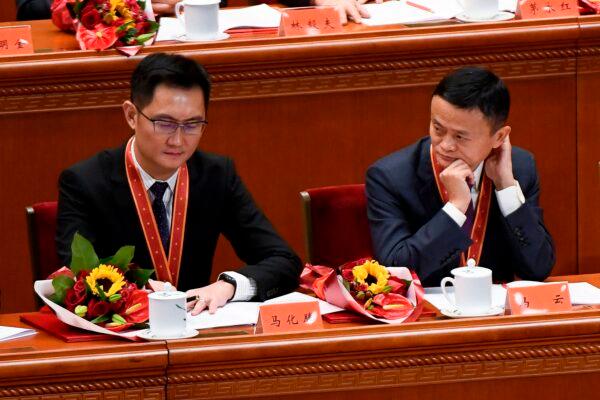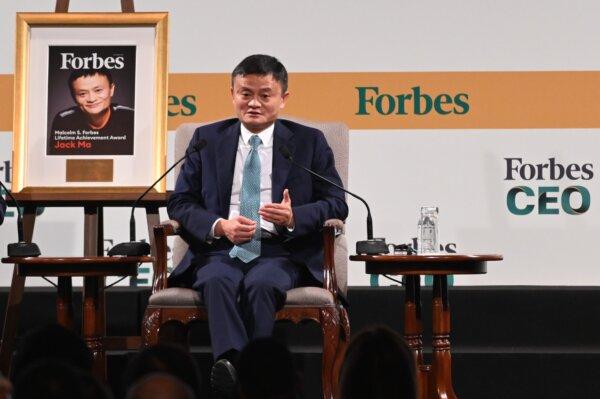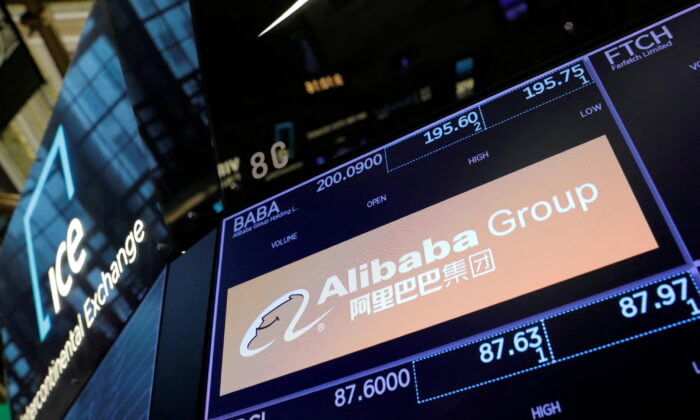Experts say it’s the CCP’s ‘joint state-private ownership 2.0’ where the ’state advances and private sector retreats.’
Chinese tech giant Alibaba disclosed in documents filed in the United States and Hong Kong over the weekend that part of its stakes in more than a dozen entities are held by Chinese state-owned enterprises or foreign sovereign wealth funds, in response to an inquiry from the U.S. Securities and Exchange Commission.
The Chinese communist regime has wider control of Alibaba than previously known to the outside world, especially the “golden shares” held by the regime to control it and other private Chinese technology companies have drawn wide attention.
Alibaba explained in a notice that the disclosures were made “in response to certain comments from the staff of the SEC” as an amendment to its earlier filing from July, according to Bloomberg.
Chinese state-owned enterprises hold shares in Alibaba’s six direct sales businesses, which accounted for less than 6 percent of Alibaba’s total revenue in the fiscal year ending in March 2023. Five of them have a shareholding ratio of less than 10 percent, and another has a shareholding ratio of less than 30 percent.
Chinese state-owned enterprises have ownership stakes in multiple business entities including sports, health, logistics, and local consumer services owned by the Alibaba Group. Alibaba did not disclose the specific entities in its filing.
Meanwhile, Chinese Communist Party (CCP) leader Xi Jinping said at a meeting of the Central Commission for Deepening Reform on Feb. 19 that it is necessary to improve the centralized and unified leadership system of the CCP for scientific and technological development. The statement possibly indicates the regime plans to continue to tighten its grip over Chinese tech companies.
‘Golden Shares’
Alibaba’s new filings brought attention to the “golden shares.” Typically, it’s equal to about 1 percent of a firm, obtained by the CCP through state-backed companies or funds, and provides a mechanism to allow the regime to nominate directors or influence key company decisions.
Beijing adopted this new way to control private-owned leading Chinese tech companies in 2023, such as Alibaba and Tencent.
In January last year, the CCP purchased one percent of the shares of two companies under the Alibaba Group through state-owned companies. Among them, the investment company affiliated with Zhejiang Radio and Television Group acquired one percent of the shares of Alibaba’s audio-visual platform Youku, and Zhejiang Radio and Television Group obtained a director seat.
Another Alibaba subsidiary in Guangzhou, Guangzhou Lujiao Information Technology, had one percent of its shares obtained by a Beijing-based company named Wangtou Huicheng which is owned by China Internet Investment Fund (CIIF) jointly launched by the CCP’s Cyberspace Administration and the Ministry of Finance.
Henry Wu, a macroeconomist in Taiwan, told The Epoch Times on Feb. 28 that the equity acquired by China’s state-owned enterprises accounts for about 6 percent of Alibaba’s revenue, which is actually not high. The key is that the CCP uses the “golden shares” to nominate directors, and it can intervene in the company’s important decisions.
It could be called a new form of “joint state-private ownership,” he said.
The CCP implemented a system of “joint state-private ownership” in 1956 to nationalize private-owned industries and commerce.

Mr. Wu said that in the new era, the CCP’s strategy is called “state advances while private sectors retreat.” The way the state advances does not mean that state-owned enterprises enter various fields directly, but hold 1 percent of the golden shares in private enterprises in various fields. In this way, the CCP can indirectly control them instead of direct control, which is a new type.
“In the future, it will use this method, which is 1% equity share, using Alibaba as an example. If Alibaba accepts it, other companies will probably have to accept it, and the state may not need to pay for this 1% share,” he said.
As to the effect, Mr. Wu said, “It still needs to be seen, but basically it will hurt the private enterprises’ willingness to develop and hurt the investment direction or investment energy of private entrepreneurs. In fact, it will have side effects, and negative effects may be even greater.”
Wang Guo-chen, assistant researcher at The Chung-Hua Institution for Economic Research in Taiwan, told The Epoch Times on Feb. 28, that the CCP tightening its control of private enterprises through the “golden stocks” will indeed spark more concerns of foreign-funded or private enterprises. “Foreign-funded enterprises may be even more reluctant to enter China. Of course, private enterprises in mainland China will continue to flee China if they can. Those that cannot, will not increase additional investment to avoid being harvested by the regime.”
‘Dance With Shackles On’
Jack Ma has been targeted and his businesses have faced pressure the past few years. His experience has become the epitome of the fate of Chinese private entrepreneurs.
Mr. Wang said that private entrepreneurs like Mr. Ma are now working while wearing shackles, transfusing blood for the Party and state.
“They probably won’t have much control over business decisions in the future. They must comply with the decisions of the CCP. But it’s not just private enterprises, like the People’s Bank of China, the first thing in its work report this year is to obey the Party’s command. So it’s not just private enterprises wear shackles, and even state-owned enterprises wear shackles and government agencies also do things with shackles on.”

Mr. Wu pointed out that because Mr. Ma has to consider his family in China, if he were to run away, the CCP would threaten him, using his family’s safety.
He believes Mr. Ma is mainly just cooperating with the CCP to put on a show. “Xi Jinping is now using Jack Ma and Alibaba as examples to show his iron fist to others. From now on, China’s private entrepreneurs will run if they can, and lie flat [doing nothing as a passive way of resistance] if they can’t.”
Mr. Ma and wife were seen in Singapore last week. It’s reported that Mr. Ma’s wife bought three units in a commercial-zoned area in Singapore.
Ning Haizhong and Luo Ya contributed to this report.

